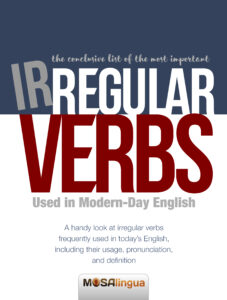Believe it or not, German grammar isn’t that complicated… If you use the right methods, tips, and advice. To explain it to you properly, we’re tackling one topic at a time. Today we’re talking about the present tense in German.
How to construct it, how to use it, and most importantly how to use it easily. If you are just starting out with German, it’s good to start with the present. As they say, there’s no time like the present! It’s the easiest to learn, and you can even use it to talk about the future… That’s right, and we’ll explain how!

6 Things to Know to Use the Present Tense in German Correctly
1. The Two Endings in the Dictionary
The first piece of good news is that in the dictionary, all German verbs end in either -en or -n. For example: lernen, haben, finden, kommen, gehen, lächeln, and feiern. There are no verb groups, like in Latin languages such as French, which makes things a lot easier.
2. One Form to Learn for Talking about the Present in German
In German, there is only one tense to express actions in the present (whether they’re actions in progress or in a general time period). In English and in other languages, for example, we distinguish between the simple present, when speaking of a general action, and the present continuous (in -ing), when speaking of an action in progress. Not in German! So you have no rules to learn about when to use the present.
So, how do you form the present tense in German?
You just need to 1. take off the ending -(e)n from the infinitive form, and then 2. add the present tense endings. Let’s look at an example, the verb lernen:
- ich lerne
- du lernst
- er, sie, es lernt
- wir lernen
- ihr lernt
- sie/Sie lernen
3. Concentrate on a Few Pronouns…
At first, we recommend that you focus on the most commonly used “everyday” German pronouns. Namely “I” and the formal and informal versions of “you”: ich, du, and Sie.
Conjugating with “ich”
“I learn German” is “Ich lerne Deutsch.” In this sentence, you can see the form of “lernen” for the verb for “ich” = “ich lerne.”
Conjugating with “du”
“You learn German” (the informal version) becomes “Du lernst Deutsch.” Take off the “-en” of “lernen” and you’re left with “lern-.” Then add the ending “-st” for the second person form. That gives us “du lernst.” This form is perfect if you are talking to a friend or a young person.
If you’re talking to someone older than you or who you don’t know, there’s a more appropriate pronoun to use…
Conjugating with “Sie”
Here, you’d say: “Sie lernen Deutsch” which is more polite than “du lernst Deutsch.”
Let’s look at another common verb: “gehen,” which means “to go.”
- “I go” becomes “Ich gehe.” In spoken language, you might also hear the shortened form, “ich geh.“
- “You go” becomes “du gehst” in the informal and “Sie gehen” in more formal contexts.
So you would say, “ich gehe ins Kino,” “du gehst ins Kino,” and “Sie gehen ins Kino.” Easy enough, right?
With this formula, you can conjugate all German verbs in the present. As you can see, it’s not hard to construct the present tense in German. You just need to use the infinitive to help you.
4. One Ending, Three Pronouns
You might have noticed that the ending -en is used by three personal pronouns:
- wir = when you are speaking about two or more people, including yourself
- sie = which corresponds to the English “they,” used to talk to a group
- Sie with a capital letter = the pronoun to use when you are talking to a person or group in a formal setting.
5. Concentrate on 2 (and Only 2!) Irregular Verbs
Yes, it’s true, there are some irregular verbs in German. But our trick to make learning easier is to start by learning the two most important ones:
- sein = to be
- haben = to have
These two irregular verbs are used every day. So it is essential to know them from the beginning of your German studies. They will also be very useful for you when you want to form the past tense later on.
Let’s start by conjugating the verb “sein“:
- ich bin
- du bist
- er / sie / es ist
- wir sind
- ihr seid
- sie/Sie sind
And the verb “haben“:
- ich habe
- du hast
- er / sie / es hat
- wir haben
- ihr habt
- sie/Sie haben
You need to learn these two verbs by heart. The other irregular verbs are normally only irregular in the singular forms, “ich,” “du,” “er,” “sie,” and “es.” They most often take the so-called “normal” endings, and then change the vowel on the stem of the verb. But we’ll come back to that in another lesson.
6. Learn the Present… And Know How to Talk About the Future!
Finally, once you master the present tense in German, you can use it in several ways. It isn’t just used to talk about habits, general information or actions that are happening right now. You can also use it to talk about future events.
So you can say: “Ich gehe ins Kino” = “I am going to the movies” or “Ich gehe morgen ins Kino” = “I’m going to the movies tomorrow.”
You don’t have to learn a lot of grammar to build short, simple sentences, and to express yourself easily. And even if you make small mistakes, people will understand you. And remember, this is your goal at the beginning: if people understand you, then that’s enough.
Our Tricks for the Present Tense in German… On Video
Need a recap? Then I recommend taking a look at this video by Laura, our German teacher. She explains how to easily use the present tense in German. You can watch this video on our YouTube channel or directly below. The video is in German, but don’t worry, subtitles are available in English, French, and German.
Don’t forget to subscribe to our YouTube channel for more tricks on video
Just starting out learning German? Don’t miss these other useful articles:
- Our article on easy German grammar
- Learn German quickly, a handy collection of useful German resources
- Our comprehensive German grammar guide for all of your grammar needs!
Related posts:
Start improving your German today
Good news: we can help!
More good news: you can get started for free! With your free trial, you can test drive the most effective method for learning German for the next 15 days!
Vocabulary flashcards, videos with subtitles, audiobooks, articles adapted to your level – with MosaLingua Premium (Web & Mobile), you’ll have access to all this and more. Get started right now. It’s free—and risk-free—to try!





Comments